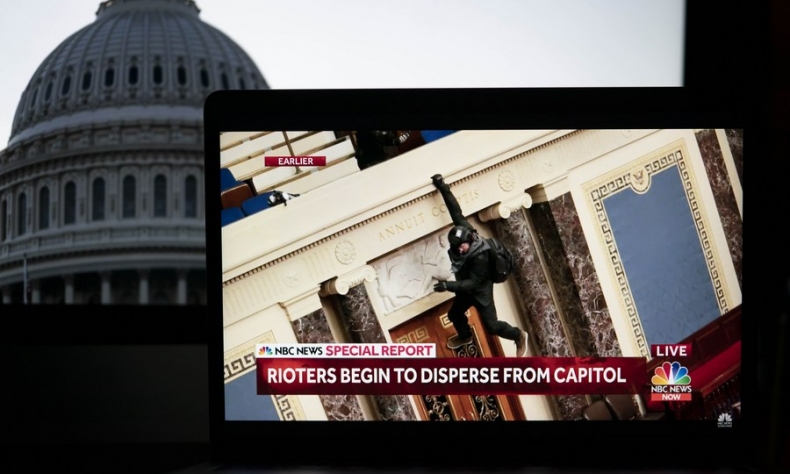America’s Double Standards on Insurrection

Ideological thinking and projection clouds the fact that rule of law, stability and order are as desirable in China as it is in America itself.
Last week, when a mob of pro-Trump rioters stormed the U.S. Capitol in Washington D.C., there was no shortage of condemnation to be found. Politicians in the United States and the world alike decried the violence and branded it an insurrection and “domestic terrorism.”
The move was depicted as an assault on the American political system itself, and, in turn, Democrats are lining up to impeach Donald Trump for a second time over his alleged role in instigating the unrest. Of course, it is common sense to condemn such violence on unambiguous terms.
If only such judgments were applied consistently. In 2019, Hong Kong rioters equally launched a violent attack on the city’s legislative council building and engaged in extensive vandalism. The assault marked a turning point in the special administrative region’s unrest.
Their behavior, however, was not met with the same international outcry and most ironically in the United States itself, wherein the same politicians, journalists and voices who decried the Washington attack actively encouraged and applauded unrest in Hong Kong under the auspices of “pro-Democracy protests.”
The double standards manifest in the BBC’s coverage of the two events for one, was striking. A consistent ideological cheerleader for unrest in Hong Kong, the BBC always avoided use of the terms like “mob,” “terrorists,” “insurrection” and “rioters” to describe the protesters, instead calling them a “pro-democracy protesters.”
Compare this with its coverage of the U.S. Capitol attack, when it immediately headlined the perpetrators as “a violent pro-Trump mob” lauding the unacceptability of one event, but not the other.
There is a literal form of doublespeak embedded throughout all commentary, which presents one violent scenario as okay, but not the other, and subsequently demonized law enforcement in Hong Kong for resisting it.
The West believes it has a right to intervene in the affairs of other countries, via violence if necessary, but that nobody has the same right to do so to itself even if the unrest is organic.
The problem lies with ideology. Western political thought presents itself as a universal moral truth that analyses the world in a simple binary of good vs. evil. Rather than assessing political forces through the socio-economic environments and interests producing them, it argues that those who hold up the banner of “Liberal-democracy” are always good and truthful and those who hold alternative worldviews are always bad and must be maligned.
In line with this, only the actions of the former can hold “legitimacy” and “authenticity” and the actions of the latter are always attributed to motives of evil, irrespective of the situation at hand.
As a result, liberal thought and commentary skewers the pursuit of violence in one situation to be objectively bad, and in another to be objectively good. The Trump supporters who sought to occupy the Capitol Building are evil because they want to undermine the political order of the United States, while the Hong Kong rioters are apparently “good” because they want to undermine the political order of the Hong Kong Special Administrative Region.
There is a double standard here. Ideology clouds the reality that both groups are in fact, violent insurrectionists who want to overturn and subvert a political system that they dislike and fashion it according to their own interests and identity. In terms of the physical laws of the territories in which they reside, neither truly has any right.
However, the world of Western media and politics disagree. They believe one group has a right to challenge the system outright, but not the other, peddling the assumption that the Chinese government and Hong Kong authority have no legitimacy, therefore can be challenged.
Legitimacy in the political sense is subjective and circumstantial, it is not for one set of countries to decide theoretically on behalf of others whose rule is supported and who’s is not.
In turn, the broader question might be: “Is the U.S. system legitimate?” Because the mere existence of Democracy does not mean that it delivers the results its people desire, and the fact that a certain constituency of American voters – up to 56% – believed the “election was rigged” suggests something is wrong.
Yet the U.S. political classes will insist their constitution, their order is always untouchable and nobody can “legitimately” rebel against it. Right? Few would argue national security is a form of oppression in this instance.
In this case, the United States and its allies might want to introspect rather than to encourage violent uprisings in other countries and undermine the responses of those who seek to prevent it. If violent insurrection is wrong in the United States, then it is perfectly acceptable for authorities in Hong Kong and China to describe it as such, too.
Ideological thinking and projection clouds the fact that rule of law, stability and order are as desirable in China as it is in America itself, and subsequently the U.S. and its allies in taking precaution to preserve their own order, have no real right to encourage unrest in other countries or to question procedures such as the national security law geared at preventing violent insurrection.
 Facebook
Facebook
 Twitter
Twitter
 Linkedin
Linkedin
 Google +
Google +







